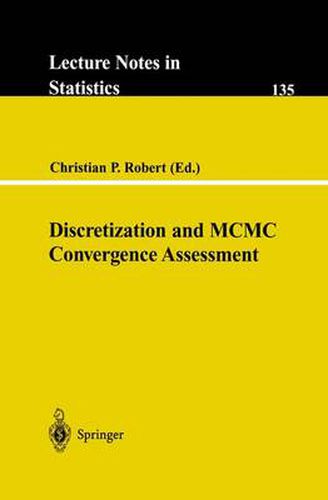Readings Newsletter
Become a Readings Member to make your shopping experience even easier.
Sign in or sign up for free!
You’re not far away from qualifying for FREE standard shipping within Australia
You’ve qualified for FREE standard shipping within Australia
The cart is loading…






This title is printed to order. This book may have been self-published. If so, we cannot guarantee the quality of the content. In the main most books will have gone through the editing process however some may not. We therefore suggest that you be aware of this before ordering this book. If in doubt check either the author or publisher’s details as we are unable to accept any returns unless they are faulty. Please contact us if you have any questions.
This monograph proposes several approaches to convergence monitoring for MCMC algorithms which are centered on the theme of discrete Markov chains. After a short introduction to MCMC methods, including recent developments like perfect simulation and Langevin Metropolis-Hastings algorithms, and to the current convergence diagnostics, the contributors present the theoretical basis for a study of MCMC convergence using discrete Markov chains and their specificities. The contributors stress in particular that this study applies in a wide generality, starting with latent variable models like mixtures, then extending the scope to chains with renewal properties, and concluding with a general Markov chain. They then relate the different connections with discrete or finite Markov chains with practical convergence diagnostics which are either graphical plots (allocation map, divergence graph, variance stabilizing, normality plot), stopping rules (normality, stationarity, stability tests), or confidence bounds (divergence, asymptotic variance, normality). Most of the quantitative tools take advantage of manageable versions of the CLT. The different methods proposed here are first evaluated on a set of benchmark examples and then studied on three full scale realistic applications, along with the standard convergence diagnostics: A hidden Markov modelling of DNA sequences, including a perfect simulation implementation, a latent stage modelling of the dynamics of HIV infection, and a modelling of hospitalization duration by exponential mixtures. The monograph is the outcome of a monthly research seminar held at CREST, Paris, since 1995. The seminar involved the contributors to this monograph and was led by Christian P. Robert, Head of the Satistics Laboratory at CREST and Professor of Statistics at the University of Rouen since 1992.
$9.00 standard shipping within Australia
FREE standard shipping within Australia for orders over $100.00
Express & International shipping calculated at checkout
This title is printed to order. This book may have been self-published. If so, we cannot guarantee the quality of the content. In the main most books will have gone through the editing process however some may not. We therefore suggest that you be aware of this before ordering this book. If in doubt check either the author or publisher’s details as we are unable to accept any returns unless they are faulty. Please contact us if you have any questions.
This monograph proposes several approaches to convergence monitoring for MCMC algorithms which are centered on the theme of discrete Markov chains. After a short introduction to MCMC methods, including recent developments like perfect simulation and Langevin Metropolis-Hastings algorithms, and to the current convergence diagnostics, the contributors present the theoretical basis for a study of MCMC convergence using discrete Markov chains and their specificities. The contributors stress in particular that this study applies in a wide generality, starting with latent variable models like mixtures, then extending the scope to chains with renewal properties, and concluding with a general Markov chain. They then relate the different connections with discrete or finite Markov chains with practical convergence diagnostics which are either graphical plots (allocation map, divergence graph, variance stabilizing, normality plot), stopping rules (normality, stationarity, stability tests), or confidence bounds (divergence, asymptotic variance, normality). Most of the quantitative tools take advantage of manageable versions of the CLT. The different methods proposed here are first evaluated on a set of benchmark examples and then studied on three full scale realistic applications, along with the standard convergence diagnostics: A hidden Markov modelling of DNA sequences, including a perfect simulation implementation, a latent stage modelling of the dynamics of HIV infection, and a modelling of hospitalization duration by exponential mixtures. The monograph is the outcome of a monthly research seminar held at CREST, Paris, since 1995. The seminar involved the contributors to this monograph and was led by Christian P. Robert, Head of the Satistics Laboratory at CREST and Professor of Statistics at the University of Rouen since 1992.